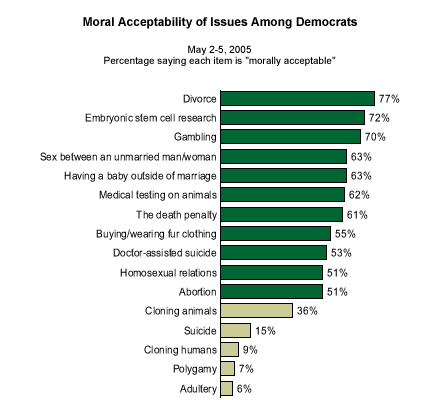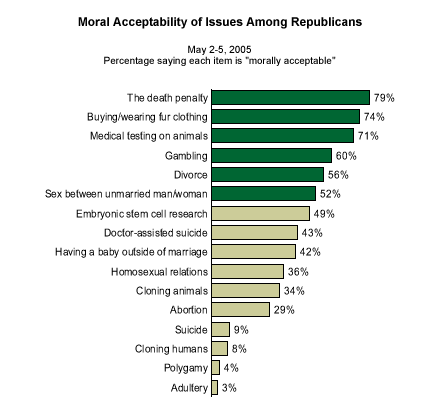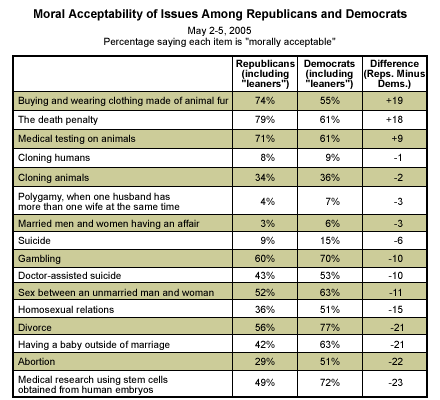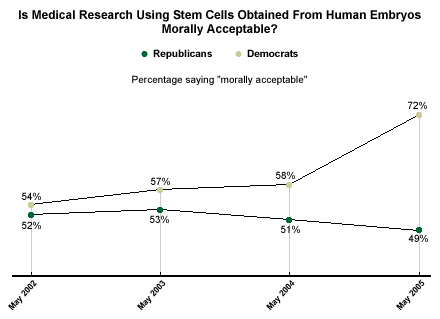Â鶹´«Ã½AV's annual survey on values and beliefs asked Americans to rate 16 issues as "morally acceptable" or "morally wrong." A review of the data shows substantial differences between Republicans' and Democrats' views of what is morally acceptable.
Republicans find the death penalty, buying and wearing fur clothes, and animal testing to be the most morally acceptable items on the list, while Democrats rate divorce, embryonic stem cell research, and gambling as the most morally acceptable. The issues with the largest partisan gaps include embryonic stem cell research, abortion, having a baby out of wedlock, divorce, buying and wearing fur clothes, and the death penalty.
Over the past several years, while there have been significant gaps between what Republicans and Democrats find morally acceptable, these gaps have shown only minor variations, with the lone exception of embryonic stem cell research, which has seen a surge in support among Democrats.
What Do Republicans and Democrats Consider Acceptable?
The poll, conducted May 2-5*, finds that Democrats (including independents who lean toward the Democratic Party) view more issues as morally acceptable than Republicans do (including those independents who lean toward the Republican Party).
Of the 16 issues tested in the poll, a majority of Democrats view 11 of them as morally acceptable: divorce, embryonic stem cell research, gambling, sex between an unmarried man and woman, having a baby outside of marriage, medical testing on animals, the death penalty, buying and wearing clothing made of animal fur, doctor-assisted suicide, homosexual relations, and abortion.

At least 7 in 10 Republicans say the death penalty, buying and wearing clothing made of animal fur, and medical testing on animals is morally acceptable. A majority of Republicans also say gambling, divorce, and sex between an unmarried man and woman is acceptable.

The bottom of the list is essentially the same for both Republicans and Democrats. The issues that are least acceptable to both groups are suicide, cloning humans, polygamy, and married men and women having affairs.
The Republican-Democratic Divide
There are substantial differences between Republicans and Democrats in the issues viewed as morally acceptable this year.
Republicans are much more likely than Democrats to view three issues as morally acceptable: buying and wearing clothing made of animal fur (74% for Republicans, 55% for Democrats), the death penalty (79% to 61%), and medical testing on animals (71% to 62%).
Democrats, meanwhile, are more likely than Republicans to rate eight issues as morally acceptable. There is at least a 20-point difference between Democrats' and Republicans' views of embryonic stem cell research (72% to 49%), abortion (51% to 29%), having a baby outside of marriage (63% to 42%), and divorce (77% to 56%). Democrats also are more inclined than Republicans to say homosexual relations (51% to 36%), sex between an unmarried man and woman (63% to 52%), doctor-assisted suicide (53% to 43%), and gambling (70% to 60%) are morally acceptable.

Year-to-Year Changes
Since Â鶹´«Ã½AV first began asking this question, Republicans' and Democrats' views on what is morally acceptable have shown only modest variations on a year-to-year basis. The one issue that changed dramatically this year -- possibly because of an increased focus on the issue following the death of actor Christopher Reeve and former President Ronald Reagan last summer, and during the fall campaign -- involves views about embryonic stem cell research.
In 2002, there was only a two-point difference between Republicans and Democrats on this measure, with 52% of Republicans and 54% of Democrats saying embryonic stem cell research was morally acceptable. Over the next two years, the gap widened slightly, with Democrats growing more accepting of this type of research and Republicans holding steady in their views. Now, the latest poll finds a 23-point margin between Republicans and Democrats, with just about half of Republicans and more than 7 in 10 Democrats saying stem cell research is acceptable.

*Results are based on telephone interviews with 1,010 national adults, aged 18 and older, conducted April 4-7, 2005. For results based on the total sample of national adults, one can say with 95% confidence that the margin of sampling error is ±3 percentage points. For results based on the sample of 455 Republicans and those independents that lean to the Republican Party, the maximum margin of sampling error is ±5 percentage points. For results based on the sample of 471 Democrats and those independents that lean to the Democratic Party, the maximum margin of sampling error is ±5 percentage points.
In addition to sampling error, question wording and practical difficulties in conducting surveys can introduce error or bias into the findings of public opinion polls.
